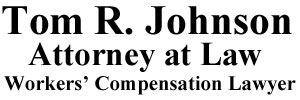A workers compensation injury is defined in California’s Labor Code Section 3208 as any injury or disease arising out of employment. It can be physical or mental ( non physical) harm. To be a valid and compensable injury it must cause disability (missed time from work) or medical treatment more than first aid. When an injury is compensable then workers compensation benefits are usually the exclusive remedy available to the injured worker. The system is designed to compensate injured workers for disabilities that occur on the job and to provide medical treatment that is reasonable and necessary to cure or relieve the effects of an injury. An injured worker does not have to prove anyone was at fault for causing the injury. The trade-off for the employer is there are limited damages that are set forth by statute. No compensation is paid for pain and suffering and other general damages like those in personal injury lawsuits. However, wages are paid while the injured worker is off work and in some instances additional permanent compensation and job retraining are available.
When an injured worker has a valid work injury it is compensable. The California compensability statute is Labor Code Section 3600. In order for an injury to be compensable, it must arise out of and occur during the course of employment. This rule is commonly referred to as AOE/COE. To determine if something arises out of the employment we look to the origin of the risk. Did the risk grow out of work-related activity, was it a mixed cause or was it purely personal? If the origin of the injury was purely personal then it may not be work related. However, even personal comforts like going to use the restroom are considered to be work related because they are incidental to the employment.
You should take care of your injury and preserve your rights. This is done by reporting the injury to your employer or immediate supervisor and seeking medical treatment right away. If you are not provided a claim form try document the reporting in writing or in front of witnesses. As soon as you are aware that an injury or condition is caused or aggravated by your work, you should contact your employer and explain the circumstances of the injury or condition. In many cases, reporting an injury immediately to the employer results in the employer sending the injured worker for medical treatment. If no care is provided seek out medical treatment on your own. If it is an emergency just go straight to the hospital. Then contact your employer when you can. It is better to seek counsel before giving a recorded statement on your case. Never quit your job or resign following an injury. If you do your employer may not have to provide temporary disability or vocational rehabilitation.
Unless you are dealing with a cumulative trauma injury (injury caused by work duties injuring a person over time by a gradual worsening) the clock is ticking even before you get medical treatment. Any delay in reporting your injury, or seeking treatment for your injury, can raise suspicions and in some cases result in a loss of benefits. If your employer has knowledge of the injury that has the same effect of filing a claim. In order to preserve your right to receive compensation an Application for Adjudication should be filed at the Workers’ Compensation Appeals Board (WCAB) within one year of the date of injury or one year from the date the last compensation was paid or medical benefit was received and paid by the worker’s compensation insurance company or their adjustor.
The date of injury is the date a specific accident occurred. When a cumulative trauma injury is claimed such as carpal tunnel due to cumulative work activities over time different rules apply. In such cases, the date of injury is one year from the date the employee knew or should have known they had suffered an injury and either missed time from work or receipt of medical treatment, more than first aid.
It is your responsibility to file all paperwork correctly. You can obtain forms from your employer or an attorney. If your employer has knowledge of the injury that has the same effect of filing a claim. But this is sometimes hard to prove so it is better to file using a DWC form 1 and keep a copy for yourself. It is also advisable to seek legal advice in all cases as a precautionary measure. The employer, and/or their insurance company, typically has unlimited resources to hire lawyers to defend every case.
In cases where an injury causes time lost from work, you should definitely seek legal representation to protect your rights. Your employer is obligated to refrain from discriminating against you for having a work injury. Your employer, or the insurance company if the employer is not self-insured, must pay for your medical treatment, including prescriptions and mileage to and from the doctor’s office, and any other medical treatment or device designed to improve your condition. The employer (or carrier) must also pay Temporary Disability (TD) according to a statutory schedule to compensate you for time lost from work due to the injury. Also, it must pay for Vocational Rehabilitation if your doctor determines you will be unable to return to your work permanently. Depending on the seriousness of your injury, it may have to pay Permanent Disability. There are significant penalties that are sometimes available against the employer and insurance company for delay or other misconduct. It is usually advisable to also file an EDD claim for disability if you are eligible for that concurrently. You are not entitled to both temporary disability (2/3 of your wages) and state disability. However, by filing it, you are preserving your right to rely on it later if necessary.
The amount of compensation allowed depends on the nature and seriousness of the injury. Typically, a temporary, total inability to work results in bi-weekly payments roughly approximate to two-thirds of your weekly pre-tax earnings. The maximum amount available is $1066.72 per week, but will be less for those who earn less than $1600.09 per week. Permanent disability generally depends on the degree of disability remaining after the doctor determines the injury has reached maximum medical improvement. The duration of permanent disability benefits is also set by a statutory schedule. These rates vary from year to year.
Although your injuries may be permanent and you may receive Permanent Disability benefits, if you are able to return to your date of injury job without limitations, the Permanent Disability is the extent of your benefit. There are guidelines used to determine permanent disability based on your age, occupation, work limitations, objective findings, and pain. This is an area where a trained insurance adjuster can really minimize your recovery if you are not prepared. It takes extensive training to be able to rate and maximize recovery in this area. If you are unable to return to your date of injury job, and the employer is unable to provide you with modified or alternative work that pays up to 85% of your former wages than they must provide you with a Vocational Rehabilitation voucher. The voucher is payable to the school you choose and if you don’t use it in a timely manner you may lose the right to it.
In some cases, both a civil lawsuit and a Workers’ Compensation claim may be filed against the employer. If a third party or defective product caused the injury then a personal injury lawsuit may be available as well. For example, when an employer asks an employee to drive on a work-related errand, and a car accident occurs in the course of that errand, the worker may file a workers’ compensation claim against his employer, as well as a “third party” lawsuit against the other driver.
Yes and no. You may bring an action before the CAB to obtain all the benefits provided in the Workers’ Compensation Act, and you may also pursue civil remedies for discrimination or wrongful termination or other civil wrongs that often occur after an injury even though they are illegal.
If your injury arose out of your employment, the Workers’ Compensation Act, in fact, prohibits you from suing your employer for personal injury in most cases. You may only obtain Workers Compensation benefits for such injuries. However, there are exceptions. In some cases, both a civil lawsuit and a Workers’ Compensation claim may be filed against the employer. If a third party or defective product caused the injury then a personal injury lawsuit may be available as well. For example, when an employer asks an employee to drive on a work related errand, and a car accident occurs in the course of that errand, the worker may file a workers’ compensation claim against his employer, as well as a “third party” lawsuit against the other driver. If your employer was illegally uninsured or intentionally caused your injury increased worker’s compensation and personal injury lawsuits are available. You should always consult an attorney who is trained to recognize these other remedies.
The fee to hire a lawyer is determined by statute. It ranges from 12-15% typically of the settlement amount. Unless in dispute and is generally not taken out of the bi-weekly Temporary Disability benefits. The typical fee is 15%. It will cost you nothing to hire the lawyer, and the lawyer works on a contingency fee, which means he or she only gets paid after your recover.
Every case is different, and the length of time usually depends on the amount of medical treatment received. A herniated disc in the back requiring surgery often requires one year away from heavy work, though some physicians recommend earlier return to work. Once the medical condition is determined to be permanent and stationary, a speedy resolution of the benefits would be 4-6 months, though many cases take a year or longer depending on the aggressiveness of the employer or insurance carrier in trying to reduce the benefits for the injured worker. The underlying case can be resolved even If the employee is still enrolled in Vocational Rehabilitation.
While an injured worker may represent herself before the WCAB. It is not advisable. The employer and carrier almost always hire a lawyer in workers compensation cases. Their lawyers job is to use every means available to assure the injured worker( you) receive the least amount of benefits possible. Even nice claims representatives have supervisors whose only job is to reduce the amount of money spent on claims. In almost every case, the 15% fee to the lawyer is greatly outweighed by the increase in benefits obtained by the able attorney representing the injured worker, not to mention the aggravation avoided by not having to deal directly with the carrier’s attorney or difficult adjusto. If you decide not to hire a lawyer at the very least contact the information and assistance officer. A service provided by the WCAB.


